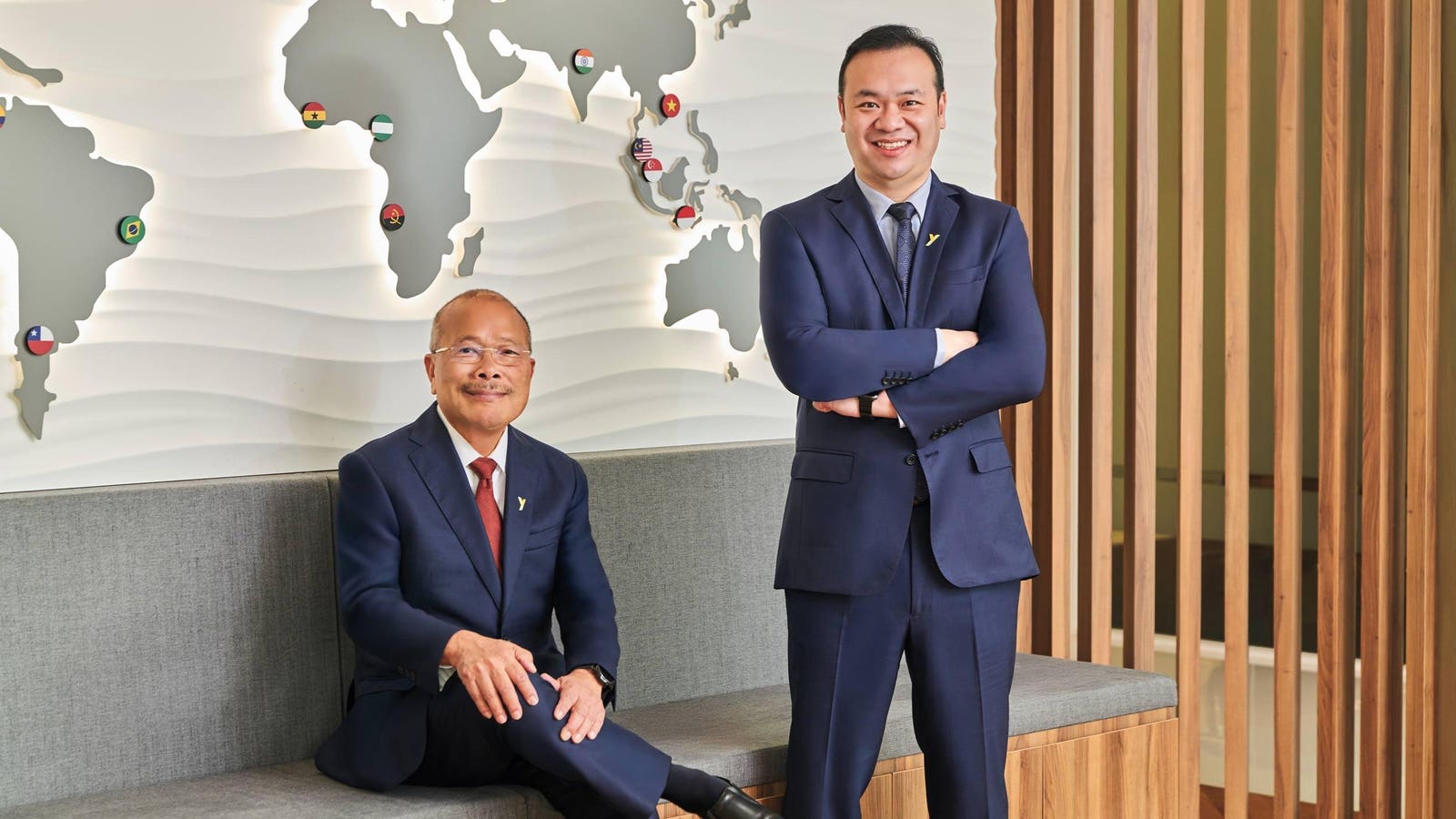Lim Han Weng and Lim Chern Yuan have turned their yinson holdings into a well-oiled machine that helps global oil and gas giants with deep-sea extractions.
This story is part of Forbes’ coverage of Malaysia’s richest 2025. See the full list Here.
AFter Participating In the APEC Summit in Peru’s Capital City last November, Malaysia’s Prime Minister Anwar Ibrahim Made a Brief Stopover in Rio de Janeiro, where he attended a reception hosted by Malaysian businessman Lim Han Weng And his son Lim Chern Yuan. The glad-handing event was to celebrate the opening of the new Brazilian Office of Yinson Production, a unit of Lim’s Bursa Malaysia-listed Yinson Holdings. Anwar waxed eloquent about the company, calling it an example of his country’s “Commitment to Supporting Global Energy Needs with Innovation and Responsibility.”
SS
Over the past Decade or So, Kuala Lumpur-based Yinson (Market Cap: $ 1.1 billion) has emerged as one of the world’s biggest providers of what’s referred to as floating production, storage and offloading (FPSO) vessels for the global oil and gas industry. These FPSO vessels, costing upward of $ 1 billion apiece, are used to extract hydrocarbons from deep-sea wells, clean out impurities, store the crude oil and eventually transfer the black gold to tankers for transport to refineries.
Yinson has nine of these heavyweight vessels in its fleet, deployed on long-term contracts, ranging from 15 to 25 years, in countries as far-flung as Angola, Ghana, Nigeria and Vietnam, in addition to Brazil. The Company has gained traction in the Latin American Country, the World’s Biggest FPSO Market, since entering there in 2018. With two vessels on contract with state-run oil firm petrobras and one with privately held energy 40% -of its annual revenue of 7.6 billion ringgit ($ 1.7 billion) in the fiscal year ended January 2025. “We have to be global,” says Lim, Yinson’s Group Executive Chairman. “We cannot just depend on Malaysia.”
Yinson’s Ranking In The Global FPSO Industry is linked to the size of its order book; It has $ 21 billion worth of leasing contracts extending until 2048. That makes the company the world’s third-largest, behind Dutch company SBM offshore with $ 35 billion and Tokyo-based modec with $ 27 billion.
Yinson took delivery of agogo fpso, its largest vessel, in February.
Courtesy of YINSON HOLDINGS
In February, the father and son were in Shanghai to attend the Namiling and Sailing Ceremony of their Biggest Vessel Yet: The $ 2 billion agogo Fpso, so named after the offshore oilfield in Angola, where it’s now on its way to be deployed. Built by A Chinese Shipyard, The Agogo is on a 15-year charter to Angola’s Azule Energy, a joint venture between BP and Italy’s Eni. With the capacity to process 120,000 barrels of oil per day, it’s expected to generate revenue of $ 5.3 billion for yinson over the leasing period. The Company claims that this is the first such vessel in its fleet to use green technologies that could reduce carbon emissions by 27% over the contract period, as compared with older vessels.
“The energy transition is going to happen. So we’re playing both sides of the equation.”
The lims have built yinson into a well-oiled money machine. With its FPSO contracts, under which operations continue whatever the price of oil, yinson holdings remained profitable even when counsel-19 battered the world. Chern Yuan, The Company’s 40-year-old Group CEO, is undaunted by Rising Macroeconomic headwinds brought by President Donald Trump’s Tariff War. “We will continue to bid for projects,” he says, adding that a long-term view is embedded in their business model. “The average lifecycle of our contracts outlasts the terms of most heads of states,” he notes.
Sea Change
Barring a recent dip, it’s been smooth sailing for YINSON HOLDINGS.
Source: YINSON HOLDINGS
Marquee International Investors Have Bought Into The Yinson Story. In January, Yinson Production Raised $ 1 billion from the sale of redeemable convertible preferred shares and warrants to a consortium that included Abu Dhabi Investment Authority, British Columbia Investment Management and Singapore-based Private Equity Firm RRJ Capital. The funds will be used to bankroll the expansion of the flagship FPSO business as well as a growing green energy portfolio under Yinson Renewables, a subsidiary that has solar and wind power projects in multiple countries.
The FPSO Atlanta is one of three vessels deployed in Brazil, Yinson’s biggest market.
Courtesy of YINSON HOLDINGS
“Renewables are already the fastest growing part of the global energy mix and the energy transition is going to happen,” says the younger lim. “So we’re playing both sides of the equation.” With the proliferation of electric vehicles and data centers, global demand for electricity is expected to rise 17% to 35,000 Terawatt hours by 2027, from 30,000 in 2022, according to the International Energy Agency in a February Report. Renewables will account for 35% of the energy mix by 2027, while coal, gas and oil will account for the rest, it said.
Yinson got into Renewables in 2020 and has built up a portfolio of over 550 megawatts with Across Asia-Pacific, Europe and Latin America. While renewables accounted for just 2% of revenue in 2024 and the business is still loss-making, Chern Yuan is confident that it will deliver “Exponential Growth” by 2030, when he’s targeting yinson to become carbon neutral.
The Older Lim, WHO Features at No. 41 among us Malaysia’s 50 Richest With a fortune of $ 480 million, is a self-made tycoon, who got his start as a car salesman after high school in Penang. In 1984, he set up a small transport and logistics company in Johor Bahru with his wife, bah Lim Kian, who continues to be actively involved as an executive director in Charge of Group Strategy. He named it yinson after his mother Yin, which translates to “Cloud Rising” in Chinese to Denote his ambitions for his venture.
The lims pose with a scale model of Agogo FPSO.
Munster Cheong for Forbes Asia
ADecade Later, He got into marine logistics supplying offshore support vessels to the oil and gas industry, starting with Africa, and listed yinson in 1996. Once Chern Yuan came on the board in 2005, after studying accountancy and finance and the company moved up the value chain. In 2011, Yinson joined a consortium LED by Petrovietnam, which was awarded a contract for a floating, storage, offloading (FSO) vessel. The next logical step was to expand into providing clients the more complex services of FPSO vessels.
“We knew if we were really serious about (growing) The business, we had to acquire some good engineering skill sets,” recalls Chern Yuan. That opportunity arose in 2013 when Norway’s Fred. Olsen production was put up for sale. YINSON ACQUIRED its BIGGER NORWEGIAN RIVAL for $ 170 million, a price that exceeded its $ 120 million market cap at the time. “We were punching above our weight,” acknowledges Chern Yuan. But the debt-funded acquisition made Yinson a full-fledged FPSO operator.
The Recent Capital Injection at Yinson Production Resulted in an anomaly, Valuing the Unit at $ 3.7 billion, more than three times the market cap of its parent. The Valuation Gap, says Ahmad Maghfur Usman, an analyst and Japanese brokerage Nomura in Kuala Lumpur, is due to concerns over Yinson Holdings’ Rising Debt. Since 2020, this has risen fourfold to 16 billion ringgit, increasing the company’s gearing ratio to about 1.9 times.
“I’m seeing more and more opportunities … I have to work until the last day.”
Chern Yuan attributes this to the four new vessels the company ordered in the past three years for more than $ 4 billion, which he says will generate enough cash flow to cover the debt obligations. Meanwhile, Yinson’s Shares have fallen 23% in the past year, partly due to the post-Tariff market meltdown. Nomura’s Maghfur Usman says the stock is undervalued and has a “buy” rating on the shares, predicting an 87% upside over 12 months.
The CEO says the company is looking to boost shareholder returns by increasing dividends and stepping up share buybacks as well as potentially spinning off yinson production and listing it outside asia. “Hopefully, these initiatives will help narrow the valuation gap,” he says.
YINSON HOLDINGS HIT A SPEED BUMP IN THE YEAR ENDED JANUARY WITH NET PROFIT SLUMPING 22% TO 752 MILLION RINGGIT ON A 35% DECLINE IN REVENUE. This was due to higher finance charges linked to increased debt and a decline in engineering revenues. “We should be seeing better results after agogo starts production,” says Chern Yuan, adding that he expects agogo, which should reach angola in mid-may, to start production by september.
At age 73, the patriarch still has plenty on his plate. He continues to run privately held Liannex, a company he started in 1993 to haul industrial commodities such as scrap iron, bauxite, coal and nickel to customers across southeast asia. “I still deal with the coal mines in Indonesia because my children don’t speak the language,” he says.
Hi Mobility is the operator of the Causeway link buses that ferry passengers across the Malaysia-Singapore border.
Courtesy of YINSON HOLDINGS
Last year, Lim Scaled Up Liannex with the acquisition of a controls interest in Icon Offshore, a supplier of offshore support vessels, for 173 million Ringgit, and placed its marine transport operations under the renamed lianson fleet group. Lim’s Youngest Son, 38-year-old Chern Wooi, is Executive Chairman of the Company, which manages a fleet of bulk cargo carriers, floating cranes, barges and floating hotels.
Lim also has a controls interest in Hi Mobility, a bus company that operates the causeway link, which shuttles passengers across the Causeway Connecting Malaysia with more than 300,000 passengers passing through the immigration checkpoints every day. The company, which has a fleet of 550 buses, raised 116 million Ringgit from an ipo in March and plans to use the funds to expand the bus fleet.
Rising Tide
Yinson’s order book has doubled in the past four years and so has debt.
Source: YINSON HOLDINGS
With a two-decade track record, hi mobility expects to benefit from the Johor-Singapore Special Economic Zone being jointly developed in the Southern Malaysia State. “The overarching more business-friendly policies under the special economic zone will create new and additional travel demand,” says Mobility CEO Lim Chern Chuen, 44, who is lim’s eldest son. The Company’s Revenue Rose 73% to 208 million Ringgit in 2024 from the previous year, with nearly half coming from Singapore.
The lims remain focused on their Crown Jewel, the FPSO Vessel Operations. As per Market Research Consultancy Energy Maritime Associates, Orders for FPSO Vessels could have exceeded $ 88 billion over the next five years. Chern Yuan says that he plans to bid for Three Mega-FPSO projects Worth at least $ 1.5 billion each in that period. He doesn’t disclose details, but maybank investment bank analyst Jeremie Yap says they are probably in Ghana, Ivory Coast and Malaysia. Yap wrote in a March research note that given its track record, “Yinson is well positioned to win future projects and could be a preferred choice for the bids.”
With his three sons well-entrenched in the family trade, the patriarch could afford to take it easy but acknowledges he’s not inclined to yet. “I’m seeing more and more opportunities,” says Lim. “I have to work until the last day.”





